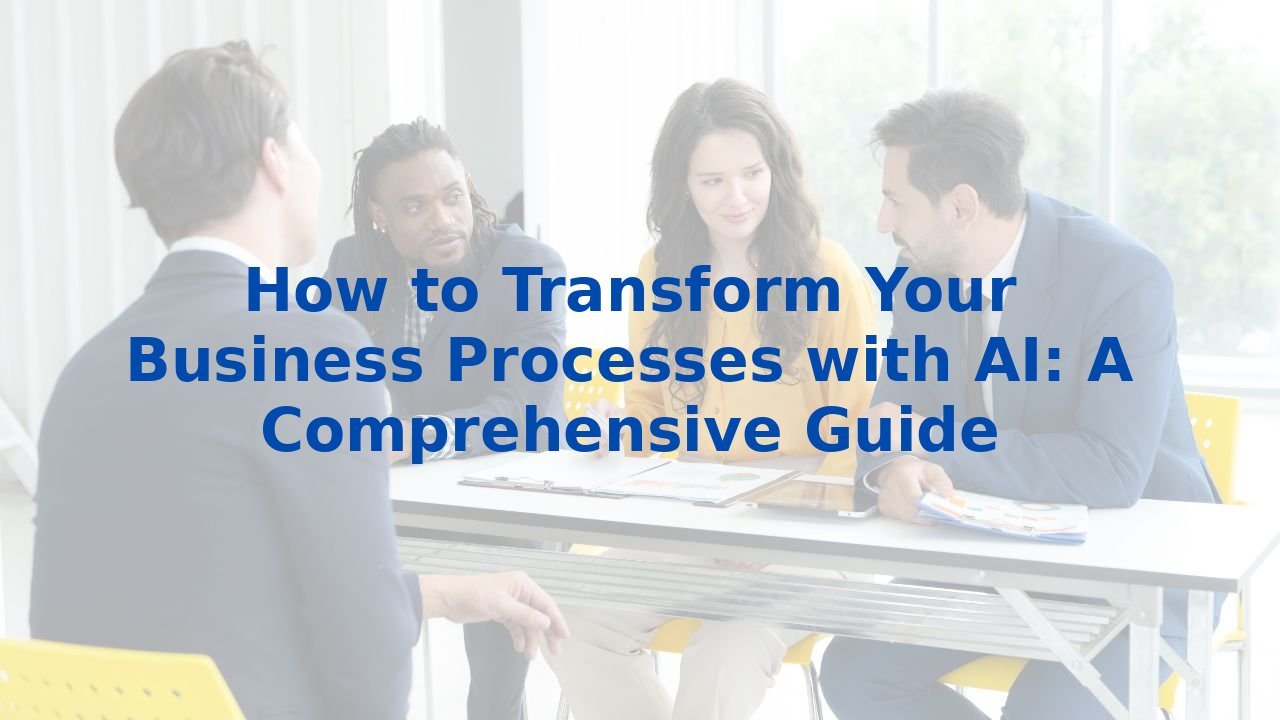How To Transform Your Business Processes with AI: A Comprehensive Guide
How To Transform Your Business Processes with AI: A Comprehensive Guide
In the ever-evolving landscape of business, efficiency and innovation are no longer just aspirations—they are necessities. Organizations are continually seeking ways to streamline their operations and elevate customer experiences. Enter artificial intelligence (AI), a transformative force that can revolutionize how businesses operate. By integrating AI into various business processes, companies not only enhance their effectiveness but also position themselves for sustainable success.
1. Improving Product Development Processes
Traditionally, product development has been an iterative and often time-consuming process. AI brings generative design to the forefront, allowing teams to input design goals and constraints while the software generates a multitude of potential solutions. This not only accelerates the design phase but also conserves resources by minimizing the need for costly prototypes that may not align with final objectives. The result? Faster time-to-market and innovative products that genuinely meet consumer needs.
2. Enhancing Customer Service
Customer service is another critical area where AI shines. By automating routine tasks, AI liberates human agents from the mundane so they can focus on delivering top-notch service. Advanced AI systems can analyze customer interactions, flagging opportunities for improvement and ensuring that every customer touchpoint is optimized. Moreover, AI-powered chatbots are revolutionizing the customer inquiry experience by providing instant assistance and routing queries to the appropriate contact, thus drastically reducing wait times and enhancing satisfaction levels.
3. Boosting Sales and Marketing
In sales and marketing, the ability to utilize data effectively is paramount. AI excels in this arena by analyzing vast datasets to extract insights that would otherwise go unnoticed. With machine learning algorithms discerning customer preferences and behavior patterns, organizations can forecast which leads are likely to convert, empowering sales teams to target high-value opportunities. Additionally, intelligent chatbots can guide potential customers through the purchase journey, addressing concerns in real-time, which helps minimize lost sales and increases overall revenue.
4. Optimizing Business Process Management
AI's capabilities extend to optimizing business process management (BPM) as well. Leveraging process mining and pattern recognition, AI can dissect existing workflows, identify inefficiencies, and automate repetitive tasks. This level of automation not only accelerates decision-making but also fosters a culture of continuous improvement by highlighting areas for innovation. As organizations harness the predictive power of AI, they position themselves to make proactive choices that enhance overall performance.
5. Automating Content Generation
Content creation is another domain experiencing an AI renaissance. Organizations can now deploy AI to generate engaging articles, marketing copy, and product descriptions at an incredible speed. What previously required hours of human effort can now be accomplished in seconds, freeing up creative teams to focus on high-impact initiatives. This not only boosts productivity but also ensures a steady stream of relevant content that can captivate audiences.
6. Enhancing Manufacturing Processes
In manufacturing, AI is fostering collaboration between humans and machines. The advent of collaborative robots (cobots) allows for a harmonious interaction that optimizes workflow while maintaining workplace safety. These autonomous machines can adapt their actions in real time, ensuring efficient production without compromising on safety standards. This innovation empowers smaller businesses to compete on a level playing field with larger manufacturers, all while managing costs effectively.
7. Refining Recruitment
AI is transforming recruitment by analyzing candidate data with unmatched speed and precision. It filters potential hires based on criteria that matter most, ultimately reducing the manual effort associated with screening resumes. By deriving insights from data analysis, organizations can make better-informed hiring decisions, resulting in a more skilled workforce poised to drive future growth.
The Benefits of Training Employees for AI
Maximizing the potential of AI requires more than just technology; it necessitates a skilled workforce. Training employees to effectively integrate AI tools offers several distinct advantages:
- Enhanced Efficiency: Employees who are well-versed in AI technologies can efficiently automate tasks, thereby boosting overall organizational productivity.
- Improved Decision-Making: Equipped with AI-driven insights, team members can navigate complex decisions with confidence, fostering strategic initiatives.
- Adaptability: A workforce trained in AI is more resilient and adaptable to technological shifts, which is crucial in maintaining a competitive edge.
- Customer Satisfaction: Employees that understand AI’s role in enhancing customer interactions can deliver superior service, invariably driving client loyalty and engagement.
Conclusion
The integration of artificial intelligence into business processes is not merely an optional upgrade; it is rapidly becoming fundamental to organizational success. From product development to customer service and sales, AI enhances efficiencies, drives innovation, and solidifies a company’s position in an increasingly competitive market. However, to fully leverage these advantages, investing in employee training is equally crucial. As organizations embrace AI, they must also commit to empowering their workforce with the skills needed to harness this technology effectively.
For those ready to embark on this transformative journey, exploring training solutions can provide the necessary foundation for success. By nurturing both technology and talent, businesses can unlock a future brimming with possibilities.



